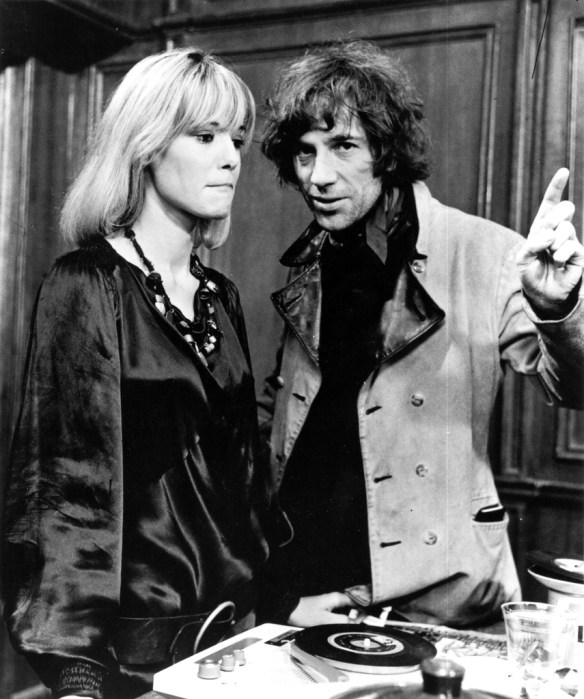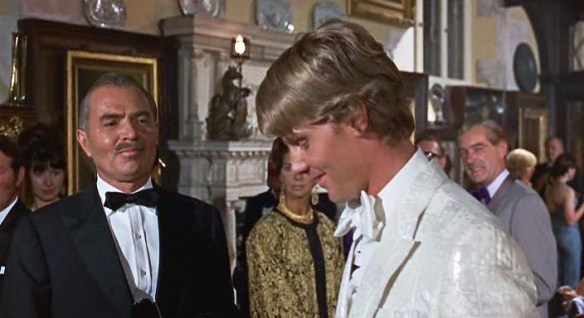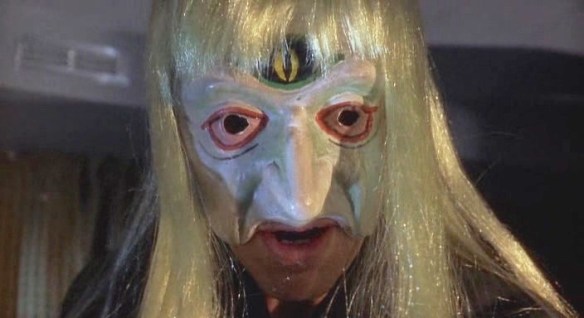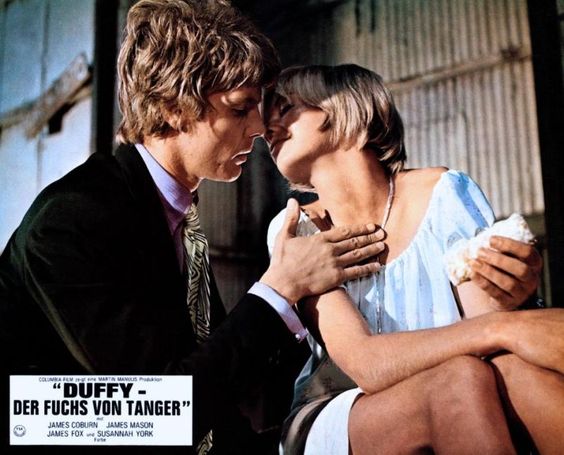 The Hollywood film industry is usually a few beats behind the rhythm of any new emerging counterculture and by the time they try to capitalize on it the parade has usually moved on. Duffy (1968) had the misfortune to be released in the dwindling days of the swinging sixties when the mod look of films such as Blow-Up and Kaleidoscope (both 1966) was being edged out by an rougher, less glamorous subgenre of youth oriented movies about bikers, drug dealers and rebels giving the finger to the establishment.
The Hollywood film industry is usually a few beats behind the rhythm of any new emerging counterculture and by the time they try to capitalize on it the parade has usually moved on. Duffy (1968) had the misfortune to be released in the dwindling days of the swinging sixties when the mod look of films such as Blow-Up and Kaleidoscope (both 1966) was being edged out by an rougher, less glamorous subgenre of youth oriented movies about bikers, drug dealers and rebels giving the finger to the establishment.
Most critics at the time were particularly unkind to Duffy, panning it as a self-indulgent, pretentious pop art disaster. In some ways you can understand their reactions even now because the movie, which is essentially a heist film, refuses to follow the conventions of the genre. Suspense or any sense of mounting tension is less important here than the mind games that the central players inflict on each other. And the stunning visual design often seems to be the intended focus of the film and not the often risible, would-be hipster dialogue which can make you winch when delivered by James Fox at his most foppish: “It’s going to be a groovy little happenin’, man!” 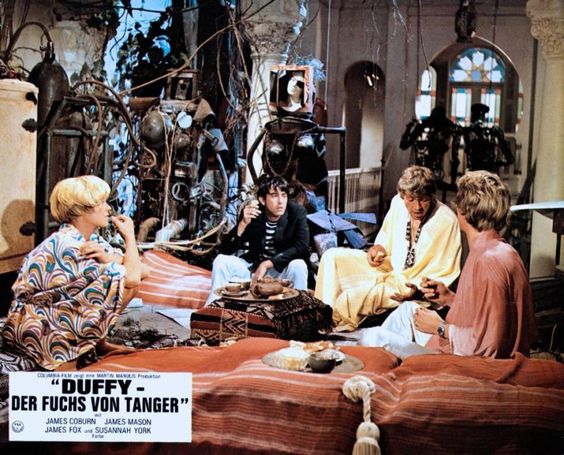
For some, however, Duffy is indeed a groovy little happening, a time capsule that captures the confusion and excessiveness of big budget filmmaking in the late sixties when unlikely projects like Candy and Skidoo (both 1968) got greenlighted by major studios. Yet Duffy is a genuine objet d’art, a bizarre curator’s egg that reveals a streak of decadence and perversity underneath the colorful proceedings, courtesy of screenwriters Harry Joe Brown, Jr. and Donald Cammell, whose next project would be the cult film Performance [1970] which he co-directed with Nicholas Roeg.

A robbery at sea committed by masked thieves is given a mod, sixties spin in Duffy, directed by Robert Parrish.
In an interview with author David Del Valle, Cammell once admitted that Duffy was semi-autobiographical. “It’s based on an adventure that really happened to a mate of mine, or maybe it was all my lovely group – Susie York, James Mason, James Coburn, and Willie [James] Fox. It’s not a serious movie, more of a bon bon, very carefree. Not worth discussing.”
Despite Cammell’s dismissive comments, Duffy could possibly be seen as a revenge fantasy inspired by the screenwriter’s relationship with his father who tried to discourage Cammell from abandoning his career as a painter.  The main storyline relates an elaborate scheme between two half-brothers, Stefane (Fox) and Antony (John Alderton), who decide to steal one million pounds in bank notes from their shipping magnate father Charles (James Mason) who has disinherited them. The bank notes are being transported in a safe aboard one of Charles’s ships, the Osiris, and Stefane and Antony enlist Duffy (James Coburn), a renowned expert at carrying out successful covert operations.
The main storyline relates an elaborate scheme between two half-brothers, Stefane (Fox) and Antony (John Alderton), who decide to steal one million pounds in bank notes from their shipping magnate father Charles (James Mason) who has disinherited them. The bank notes are being transported in a safe aboard one of Charles’s ships, the Osiris, and Stefane and Antony enlist Duffy (James Coburn), a renowned expert at carrying out successful covert operations.
Along for the ride and the money is Segolene (Susannah York), who is first introduced as Stefane’s girlfriend but soon reveals her true nature as a scheming sociopath who will bed any man who might have the inside track on the big score. When Duffy accuses her of being a slut, she takes offense, protesting “I may be a hooker. I am absolutely not a slut!” In her view, the fine distinction is that a hooker is free to choose her own destiny and customer of choice.
When the robbery finally occurs, it isn’t the piece de resistance you’d expect for a heist film (unlike Rififi or Topkapi) but a surreal charade in which the thieves are dressed in dayglo-colored wigs, kabuki-like masks and frogman gear. They escape into the sea with the loot and then the double and triple crossings begin but in a deceptively casual way that seems perfectly right for the amoral universe in which Duffy takes place.
Allegedly, Cammell was so unhappy with the finished version of Duffy that he vowed to direct his own screenplays in the future so he could control the entire process. In hindsight, Robert Parrish does seem like a curious choice for director but he did have an eclectic filmography that includes the 1951 film noir The Mob, the underrated Western The Wonderful Country [1959] and a chic adaptation of two Irvin Shaw short stories, In the French Style [1963] starring Jean Seberg.  Duffy has a stoned-out, theatre-of-the-absurd quality in which pacing and traditional storytelling techniques seem to be missing from the mix. Music, however, is an important part of the tapestry and the score by composer/songwriter Ernie Freeman is an organ-driven psychedelic rock delight that transforms several scenes into stand-alone music videos; one in particular features James Coburn wandering through a jet set beach scene to the sounds of Lou Rawls singing “I’m Satisfied.”
Duffy has a stoned-out, theatre-of-the-absurd quality in which pacing and traditional storytelling techniques seem to be missing from the mix. Music, however, is an important part of the tapestry and the score by composer/songwriter Ernie Freeman is an organ-driven psychedelic rock delight that transforms several scenes into stand-alone music videos; one in particular features James Coburn wandering through a jet set beach scene to the sounds of Lou Rawls singing “I’m Satisfied.”
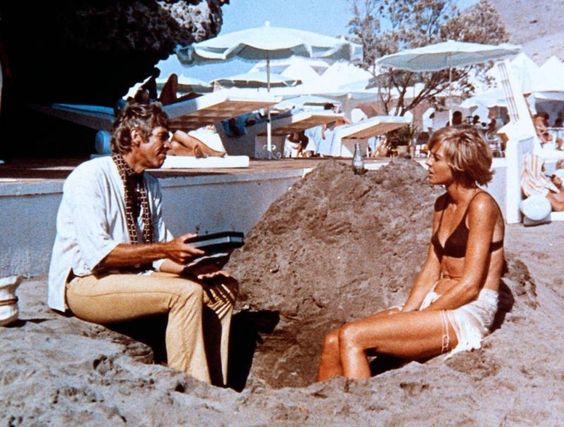
James Coburn & Susannah York on the coast of Southern Spain in Duffy (1968), directed by Robert Parrish.
The making of Duffy appears to have been a lark for most of the cast and crew and who could complain when you’re on location off the coast of Southern Spain which has never looked more dazzling and beautiful in Otto Heller’s Technicolor cinematography? Heller, who lensed more than 200 features, is probably best known for The Crimson Pirate [1953], Michael Powell’s Peeping Tom [1960] and The Ipcress File [1965], for which he won a BAFTA (British Academy of Film & Television Arts) award.
While James Coburn, Susannah York and James Fox often seem exposed and out of their comfort zone amid the surreal proceedings, James Mason seems to be enjoying himself immensely as a filthy rich aristocrat. James Coburn recalled in Sheridan Morley’s biography James Mason: Odd Man Out, “We were to do three films together, but even by the end of the third I never really knew him; the curious thing about playing a scene with James was that you’d do your bit and then wait for his reaction, which didn’t seem to come at all. Not at least until next day, when you’d see the rushes and realize that he had done it all, but so intimately that only the camera could pick it up. There was a magical thing that used to happen to his face on the screen: as he got older he got even more introspective, but he had always been the most wonderful film actor. You have only to look at Julius Caesar, where all the others are playing Shakespeare and he is playing Brutus. Unlike Niven or Granger he never really wanted to tell long anecdotes or hold people’s attention at parties. He just used to watch them all the time, as if he was about to sketch them. Sometimes, of course, that’s what he was doing.”

James Fox plays a decadent hipster who plots to rob his tycoon father in the swinging sixties caper film, Duffy.
James Fox, of course, would go on to work with his friend Donald Cammell on the latter’s next film Performance and it is interesting to see Fox’s progression as an actor from The Servant [1963], in which he plays a weak-willed young aristocrat who is manipulated by his sinister manservant, to his role as a hedonist with criminal impulses in Duffy, to his violent thug on the run in Performance. Apparently the latter film proved to be such a disturbing personal experience for him that he dropped out of the acting profession for years and didn’t return to the screen until No Longer Alone in 1978.
Cammell also battled personal demons for many years and saw many of his film projects aborted or rejected by the studios. He finally gave up the fight in April of 1996 in Los Angeles and committed suicide by shotgun.
Duffy was released as a DVD-R by SPHV (Sony Pictures Home Video) in March 2011 but has yet to surface on Blu-Ray and might not ever make the grade based on its poor performance when it was first released in 1968. TCM has shown it in the past so it might resurface again and is definitely an entertainingly peculiar time capsule.
*This is an updated and revised version of an article that first appeared on the Turner Classic Movies website.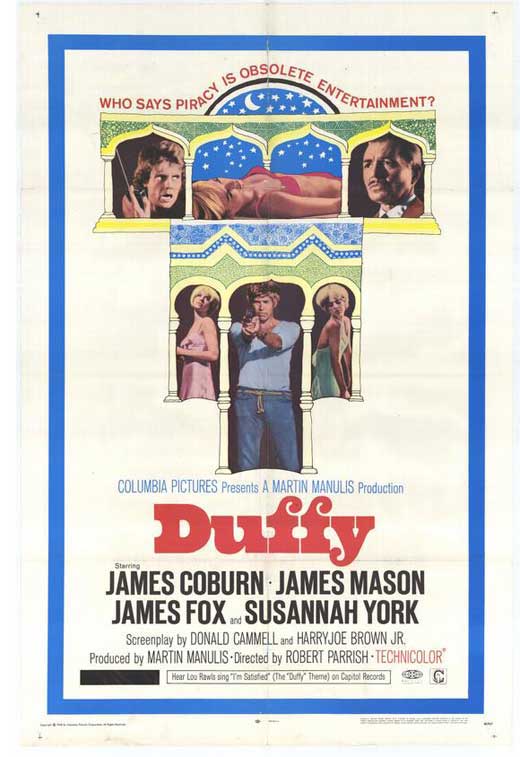
Other links of interest:
http://www.independent.co.uk/life-style/film-what-a-great-performance-1162126.html
https://www.theguardian.com/film/2013/dec/02/actor-james-fox


